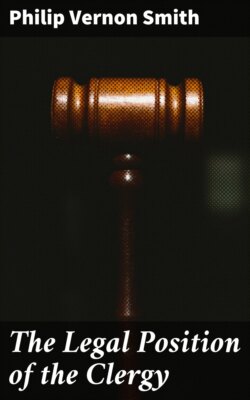Читать книгу The Legal Position of the Clergy - Philip Vernon Smith - Страница 7
На сайте Литреса книга снята с продажи.
Оглавление1. In every country where a Christian Church is permitted to exist, the power and authority of her clergy to exercise their functions will rest upon a triple basis and be subject to twofold restrictions and limitations. In the first place, (i.) they derive their spiritual authority from their ordination, and this authority is independent of the particular Church to which they belong. But, in the next place, they are bound on the one hand (ii.) to obey the regulations of the Church of which they are the ministers, and must also, on the other hand, (iii.) conform to the laws of the country in which they labour. For they can only actively exercise their functions by the licence or permission of the ruling power of that country, and subject to any conditions which it may choose to impose. These principles apply equally whether the Church is what we call established or not. The only difference is that if the Church is established, her own regulations are part of the law of the land; whereas, if she is not established, the law of the land sanctions or suffers the existence of these regulations as a private contract or arrangement between the ministers and other members of the Church. But even in the case of an established Church, her ministers will obviously be restricted in the exercise of their functions by civil regulations which do not form part of the ecclesiastical law. Thus there may be nothing in the law of his Church to prevent a clergyman from holding a religious service or preaching in a crowded thoroughfare. But in England and other civilised countries any attempt to do so would be checked by the existing laws against the obstruction of highways. In the following pages no attempt will be made to point out the non-ecclesiastical laws and limitations to which a parish priest is subject. For though they necessarily affect himself and his spiritual work, they do so only indirectly. They touch him not as a minister or even as a Christian, but as a citizen; and they touch his spiritual work only in so far as that work has a material and civil element.
